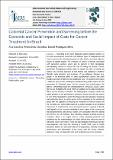COLORETAL CANCER PREVENTION AND SCREENING BEFORE THE ECONOMIC AND SOCIAL IMPACT OF COSTS FOR CANCER TREATMENT IN BRAZIL

Visualizar/
Data
2022Autor
DORNELAS, Ana Carolina Alves Diniz
SILVA, Daniel Rodrigues
Metadata
Mostrar registro completoResumo
According to the INCA National Cancer Institute, cancer is a
term that encompasses more than 100 different types of malignancies that
have in common the disordered growth of cells, which can invade adjacent
tissues or distant organs. The evolution of cancer is directly correlated
with preventive actions, which aim to prevent it from developing,
encompassing actions to reduce the risks of having the disease. Cancer
prevention encompasses actions taken to reduce the risks of having the
disease. By avoiding exposure to risk factors and adopting a healthier
lifestyle, early detection and treatment of pre-malignant diseases (e.g.
polyps in the intestinal walls) or early asymptomatic cancers that often
enables successful treatment, even leading to cure. The present work makes
a reflective study on the challenges of implementing public policies for the
prevention of colorectal cancer and its economic and social impact. We
take as a theoretical basis the considerations of CANCELA (2019), LIMA
(2015) and SCANDIUZZI et all (2019) in addition to the data provided by
INCA and the Ministry of Health. The bibliographic analysis reveals that
public policies for the prevention of colorectal cancer are still very scarce
in view of the magnitude in which the disease has been growing. Screening
and early detection is an action aimed at the population in the subclinical
phase with the objective of reducing the incidence of invasive cancer and
the mortality rate, still so little explored by public managers.It is concluded
that access to treatment for colon and rectal cancer is unequal in Brazil,
and depends on the resources available in each region of the country and
that socioeconomic and clinical factors are associated with the waiting
time for the start of treatment, thus reflecting, barriers to timely access to
treatment. There is an urgent need to create screening protocols and
conditions for the implementation of public policies that value the work of
colorectal cancer prevention. There are also strategies that require greater
encouragement even from the Ministry of Health itself, such as health
education actions to raise awareness of the population, training of health
professionals and articulation of the system with the service network,
seeking to carry out diagnostic tests. and facilitating access to treatment
Collections
- Artigos científicos [183]
